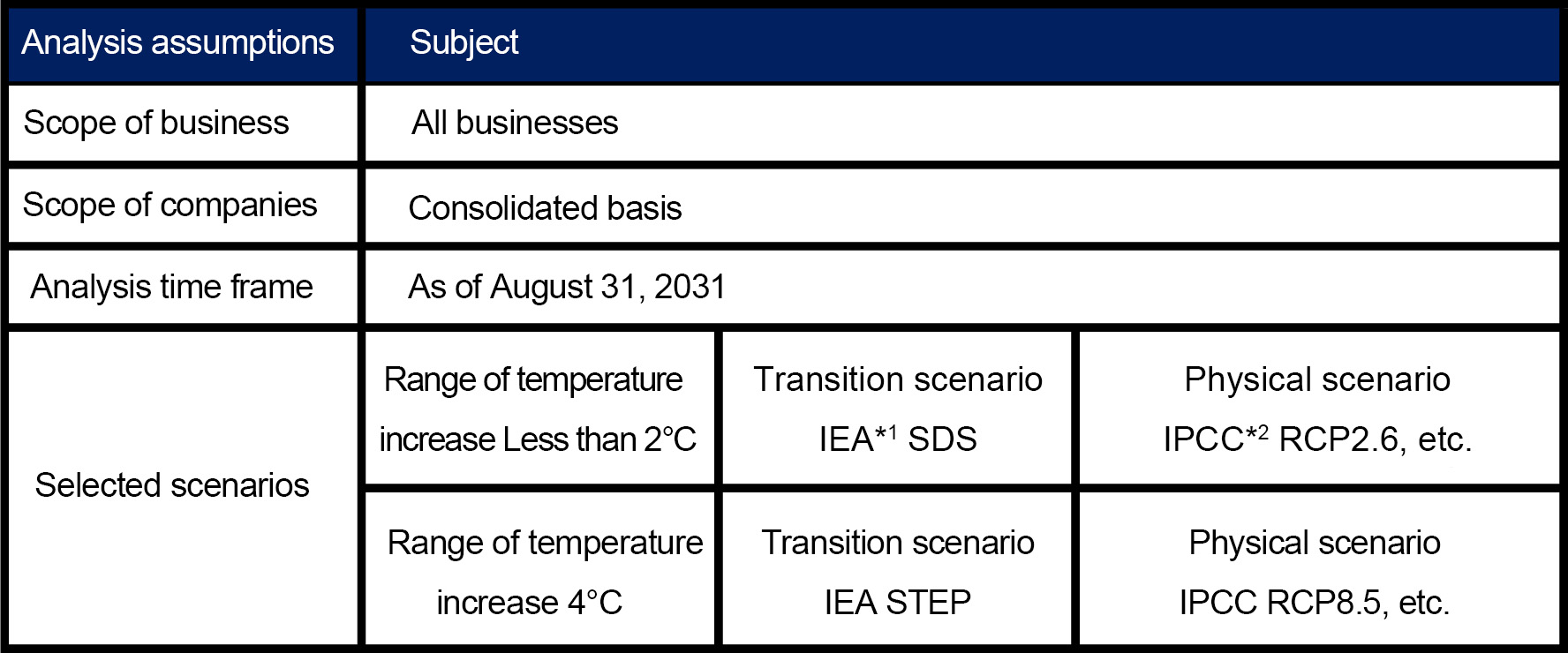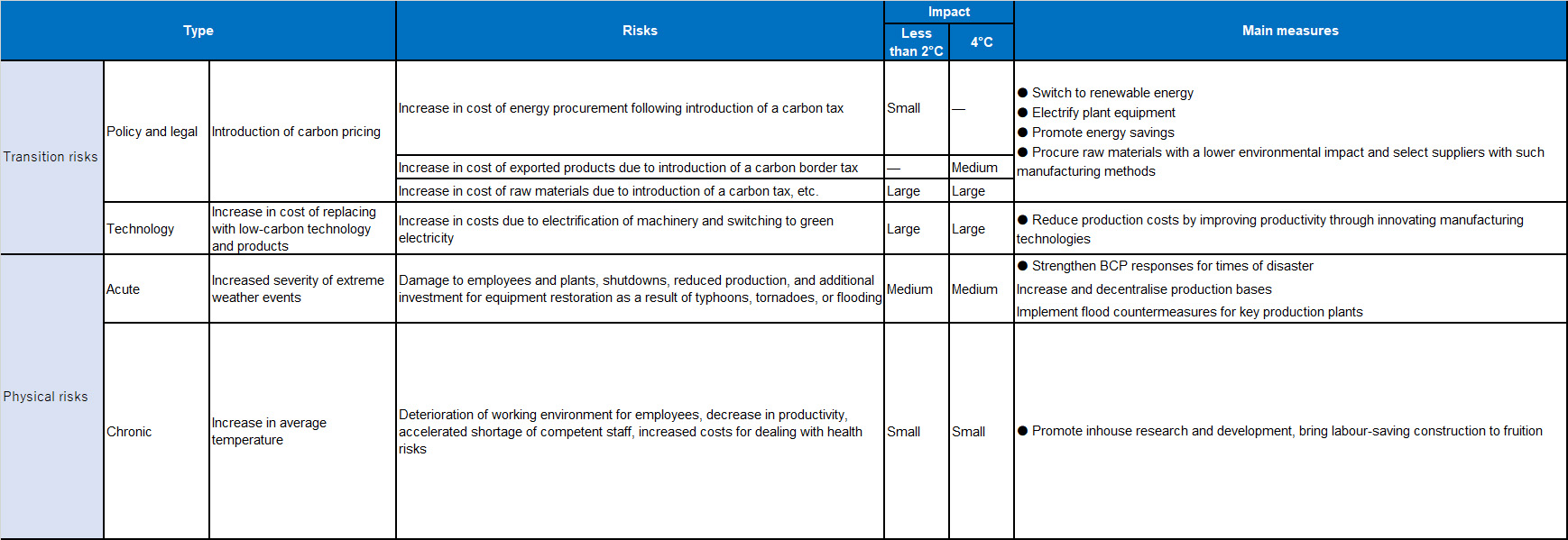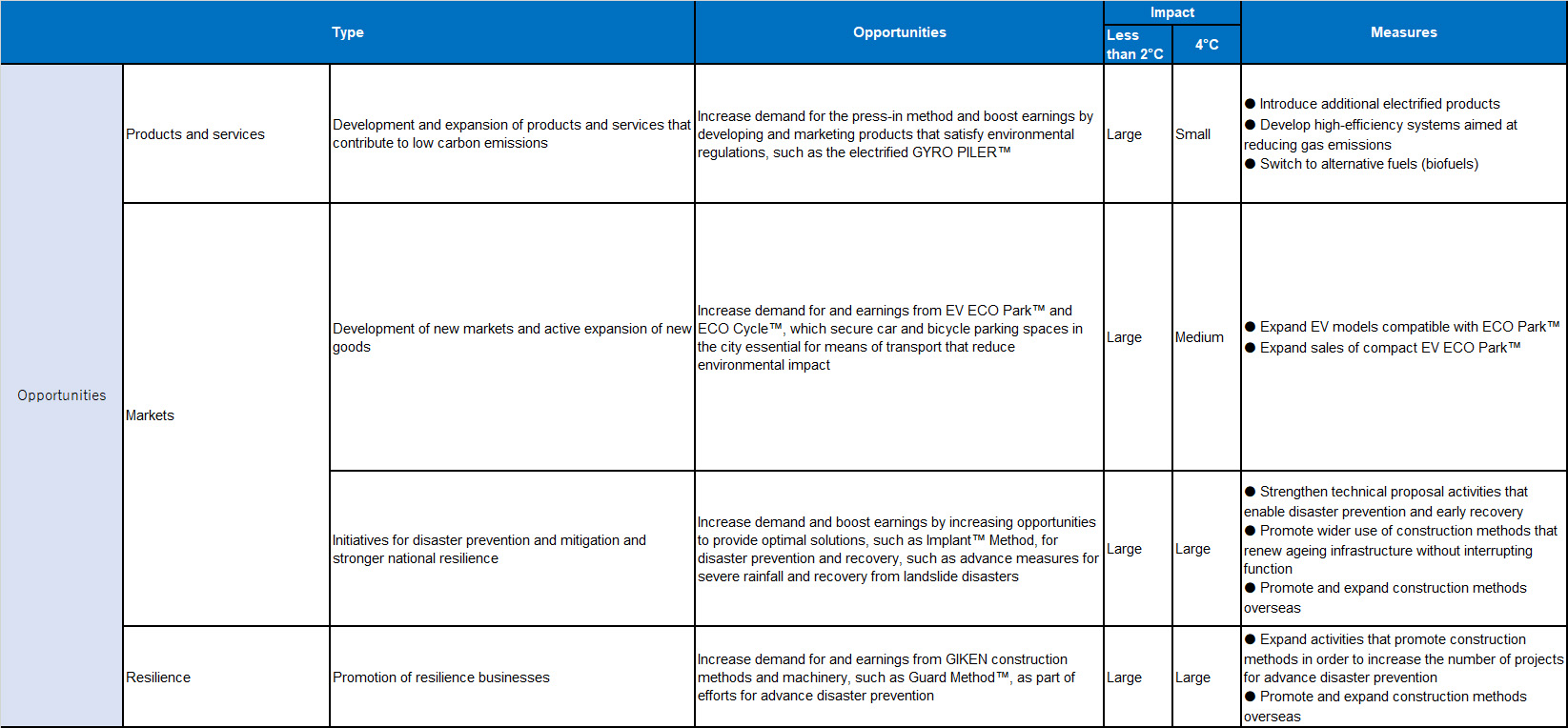GIKEN LTD. has expressed its support for the TCFD* recommendations.
Approach to TCFD Recommendations

Climate change caused by global warming from greenhouse gases poses a risk to our business activities, but also presents potential opportunities for profit. GIKEN Group regards the identification and handling of these climate change-related risks and profit opportunities as one of its key management issues, and we have analysed and examined the impact on our own business activities and summarised them in line with the TCFD Recommendations.
Provision of temporary work-free construction that can significantly reduce CO2 emissions across an entire construction project; development of an electric press-in system that enables carbon neutrality during construction; construction of the ImplantTM Structure, rigorously resilient to increasingly severe natural disasters… With core competence in press-in technologies, GIKEN Group helps combat climate change through its very business, and founded with the vision of controlling pollution from construction work, promoting such efforts is also our mission.
We will continue to promote climate change-related initiatives and contribute to the development of a sustainable society as a global engineering company.
* Task Force on Climate-related Financial Disclosures (TCFD)
The TCFD was established in 2015 by the Financial Stability Board (FSB) at the request of the G20. It recommends that organisations evaluate the financial impact of climate change risks and opportunities on their management and disclose their governance, strategy, risk management, and metrics and targets.
Governance
Recognising that addressing climate change issues is one of the most important management issues for GIKEN Group, the Board of Directors oversees efforts for tackling climate change issues. Specifically, when deliberating on management strategies and plans, where necessary, the Board of Directors makes decisions based on the risks and opportunities related to climate change issues.
In October 2022, the Board of Directors passed a resolution to establish a Sustainability Committee to promote sustainability initiatives. The Committee is chaired by a director and its members include management-level personnel, next-generation management candidates, and others appointed by the president. Working from a sustainability perspective, the Committee makes recommendations and follows up on measures regarding important management matters, including combating climate change. The Board of Directors provides appropriate oversight, including receiving reports on the activities of the Sustainability Committee.
Strategy
Scenario analysis was conducted using the following assumptions in order to assess the impact of climate-related risks and opportunities on our business, strategy, and financial plans, and to examine our responses to them.
For the analysis, we selected all businesses on a consolidated basis and a time frame of 2030. As for the scenarios, we selected a “less than 2°C scenario” (supposing that the increase in global average temperature will be held to less than 2°C above the pre-industrial average by 2100) and a “4°C scenario” (supposing that the increase in temperature will be 4°C). For the “less than 2°C scenario,” we selected the IEA’s Sustainable Development Scenario (SDS) and the IPCC’s RCP2.6, etc., and for the “4°C scenario,” we selected the Stated Policies Scenario (STEPS) and the IPCC’s RCP8.5, etc.
Assumptions of scenario analysis

*1 International Energy Agency (IEA)
*2 Intergovernmental Panel on Climate Change (IPCC)
First, we broadly identified the risks and opportunities that climate change is likely to present, and then narrowed them down to those expected to have the greatest impact. Next, we collected the parameters necessary to estimate the degree of impact, and estimated the financial impact around the year 2030, based on the less than 2°C scenario and the 4°C scenario. Finally, in response to the results of the estimation, we considered measures for increasing resilience in our organisational strategy.
Risks posed by climate change
Opportunities presented by climate change
Risk Management
Based on the belief that accurately identifying risks associated with corporate activities and either preventing them or minimising their impact if they do occur will enhance our corporate value and help us to fulfil our social responsibility to stakeholders, we have established a risk management system that covers the entire Group.
Important matters are referred to the Board of Directors for decision. Here, risks are identified and evaluated for each individual case, and appropriate measures are discussed to minimise the impact of those risks should they materialise. Climate-related risks are discussed by the Sustainability Committee and reported to the Board of Directors for deliberation as required.
Individual departments also identify the risks inherent in their business processes and implement necessary measures for risk avoidance and mitigation. In addition, each department’s risk management is audited by the Internal Audit Department.
We will continue to strengthen our risk management system with the aim of making our risk management even more advanced.
Metrics and Targets
Founded with the vision of controlling pollution from construction work, we have been providing solutions to environmental problems and contributing to the formation of a sustainable society through our business activities. Furthermore, in order to promote efforts for achieving carbon neutrality by 2050, we have established targets for reducing CO2 emissions associated with the Group’s activities.

*1
Scope 1: Direct emissions from consumption of fuel, etc
Scope 2: Indirect emissions from purchased electricity and other energy sources
*2
Scope 3: Indirect emissions not covered in Scope 1 and Scope 2




